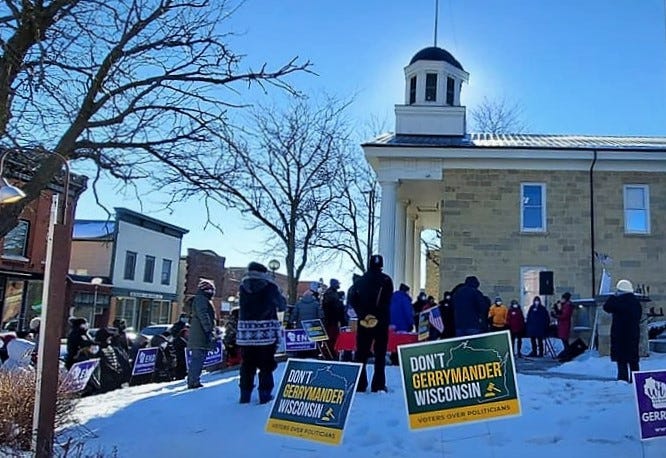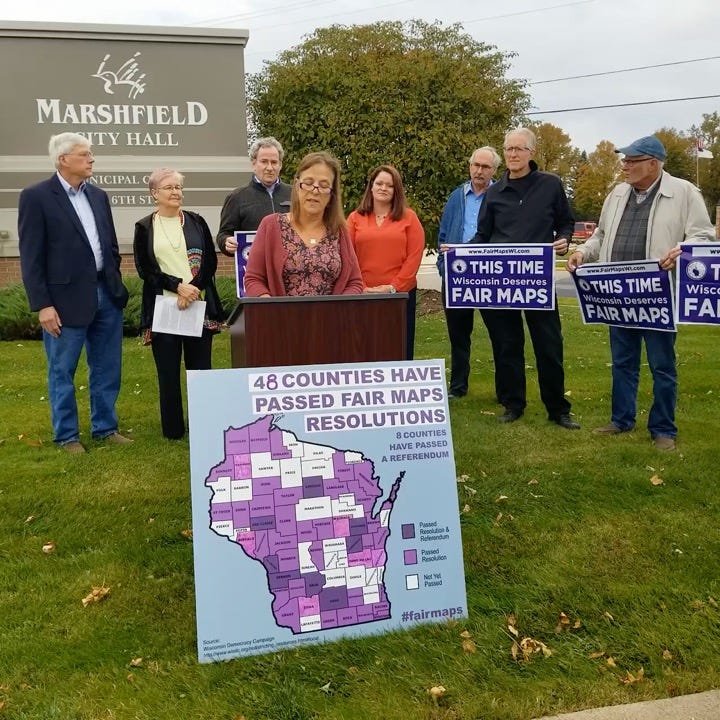How grassroots activists pushed the fair maps issue in Wisconsin
"It’s important to know that a victory for a pro-democracy justice on the Wisconsin Supreme Court will not be the end of this fight." Guest column by Carlene Bechen, Wisconsin Fair Maps Coalition.
The Recombobulation Area is a six-time TEN-TIME Milwaukee Press Club award-winning weekly opinion column and online publication written and published by veteran Milwaukee journalist Dan Shafer. Learn more about it here.
Guest column by Carlene Bechen, organizing director at the Wisconsin Fair Maps Coalition.
The gerrymandering issue, which is pivotal in this Supreme Court race, reached critical mass not by accident but by the amazing work of a group of activists and volunteers.
This is a shout out to them: The people who campaign to bring about political and social change, and the people who give freely of their time and talents to serve the common good.
For the last decade, they’ve all been relentless in their pursuit of nonpartisan redistricting reform in Wisconsin. Led by the Wisconsin Fair Maps Coalition (FMC), these folks have done everything legally within their power to bring about a change in the way legislative voting districts are drawn.
But first, a little history.
For decades, nonprofit groups like Common Cause, the League of Women Voters of Wisconsin, and the Wisconsin Democracy Campaign had been advocating for a ban on gerrymandering.
Then, back in 2013, a bunch of lawyers and pro-democracy activists met as part of the Fair Elections Project to strategize about how to undo the 2011 gerrymandered maps that were already wreaking havoc on democratic institutions in Wisconsin.
The Gill v. Whitford case was filed by a group of Democratic voters challenging the 2011 redistricting plan as an unconstitutional partisan gerrymander. A three-judge panel of federal judges agreed, and the Wisconsin Fair Maps Coalition was formed to provide advocacy and support for the ongoing litigation.
Suffice to say, after the U.S. Supreme Court concluded that these cases were non-justiciable in Rucho v. Common Cause, the group determined to take a different approach and push for nonpartisan redistricting legislation that would create a process similar to that used in Iowa.
Legislation was introduced in both chambers of the Wisconsin legislature in every session calling for a nonpartisan process. Rarely did these bills even get a committee hearing in the Republican-dominated legislature. Still, these nonprofit groups continued to beat the drum for a nonpartisan process. And they began the process of working with voters, county by county, to pass resolutions or referendums urging the legislature to ban gerrymandering.
Fast forward to 2018, Democrats won all five statewide elections — governor, attorney general, state treasurer, secretary of state and for U.S. Senate — but the Wisconsin State Legislature was stuck stubbornly with a 64% Republican majority in the Assembly and 58% Republican majority in the State Senate. Even voters who rarely noticed anything beyond the top races and their own representative knew something was rigged about the results.
The following February, a small group of volunteers started agitating and planning for a summit to educate and energize volunteers from across the state at the grassroots level into statewide action. In Nov. 2019, nearly 200 volunteers showed up in Marshfield for the Fair Maps for Wisconsin Summit. This day-long event brought together national and state experts on redistricting and the impacts of gerrymandering to educate attendees and organizers to lead “action workshops” in recruiting volunteers, working with the media, lobbying legislators, birddogging legislators and relational organizing.
Let’s be real. These activists and volunteers knew that the likelihood of convincing the GOP-dominated state legislature to pass nonpartisan redistricting reform was about as likely as meeting your doppelgänger (1 in 1,000,000,000,000) and winning the lottery (1 in 45,057,474) on the same day. But that didn’t stop them.
Over the course of the past four years, Fair Maps activists formed regional teams and recruited thousands of volunteers. Together, they have:
Educated voters about the impacts of gerrymandered maps on issues that affect Wisconsinites every day
Gathered thousands of names on petitions calling for nonpartisan redistricting reform
Helped pass a total of 55 county board resolutions and 32 county-wide referendums demanding a nonpartisan process for redistricting
Testified before the People’s Maps Commission about what fair representation looks like
Trained people to create ‘community of interest’ maps and assisted them in the process
Submitted 1,000+ maps to the People’s Maps Commission
Participated in a virtual Legislative Lobby Day to advocate for the PMC’s maps and against the ‘least change’ approach to new maps
Submitted maps to the Wisconsin Legislative Map Portal
Distributed tens of thousands of brochures about gerrymandering
Hosted dozens of educational events
Mailed thousands of postcards to voters urging them to vote
Staged marches and rallies around the state
Testified against the GOP leadership’s gerrymandered 2021 maps
Created and posted ‘Map About Maps’ videos to social media to call attention to what was happening
Held 17 simultaneous ‘Fair Courts = Fair Maps’ rallies around the state in frigid January temperatures while the maps were being batted back and forth between the Wisconsin and US Supreme Courts in 2021
Worked tirelessly to educate voters about the Wisconsin Supreme Court election and its potential ramifications on legislative voting maps
It’s important to know that a victory for a pro-democracy justice on the Wisconsin Supreme Court will not be the end of this fight. Even if the maps are re-litigated and found to be unconstitutional and new maps are in place before the 2024 election, we will still not have achieved the ultimate goal of nonpartisan redistricting reform.
That will only be accomplished when the Wisconsin State Legislature passes a law creating a nonpartisan process so voters pick the people who represent them and govern in their name.
We, grassroots activists, volunteers, and the organizations of the Wisconsin Fair Maps Coalition, will not stop until we have realized this goal.
Carlene Bechen is a retired educator who became involved in the movement to end gerrymandering after testifying before the Joint Finance Committee in support of public education for several biennial budget cycles and realizing that her words were falling on deaf ears. She has been engaged in grassroots activism since she was a child canvassing with her father in her southeastern North Carolina community. She is a founding member of the Oregon Area Progressives, which organized the Fair Maps for Wisconsin Summit for grassroots activists in the fall of 2019. From that work, Carlene was hired as Organizing Director with the Fair Maps Coalition.
Subscribe to The Recombobulation newsletter here and follow us on Facebook and Instagram at @therecombobulationarea.
Already subscribe? Get a gift subscription for a friend!
Follow Dan Shafer on Twitter at @DanRShafer.
#BucksInSix







It is a bit tricky when canvassing to make the connection between the state Supreme Court election, gerrymandering and fair maps. But it is getting easier the closer we get to Election Day.
This is incredibly dumb of me, but when I've seen those yard signs... I always thought it had something to do with the State Fair no longer providing maps of the fairgrounds. Idk, due to cost cutting??? And folks were upset bc it made it more difficult to get around the State Fair. Wild of me.